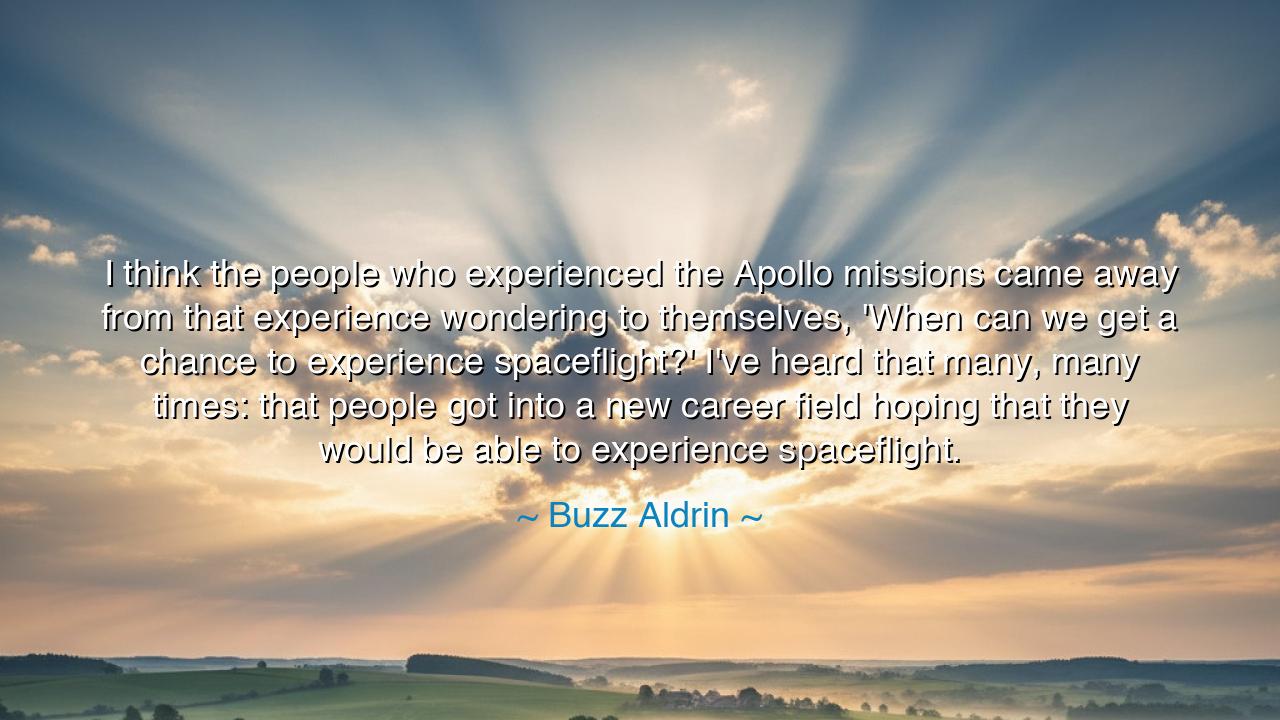
I think the people who experienced the Apollo missions came away
I think the people who experienced the Apollo missions came away from that experience wondering to themselves, 'When can we get a chance to experience spaceflight?' I've heard that many, many times: that people got into a new career field hoping that they would be able to experience spaceflight.






In the words of Buzz Aldrin, "I think the people who experienced the Apollo missions came away from that experience wondering to themselves, 'When can we get a chance to experience spaceflight?' I've heard that many, many times: that people got into a new career field hoping that they would be able to experience spaceflight," we hear the echo of a moment that forever transformed human imagination. Aldrin's reflection speaks not just of the achievement of landing on the moon, but of the lasting impact it had on the human spirit. The Apollo missions did not simply send astronauts to the moon—they sent a signal to humanity that the impossible was possible, that the limits of human potential could be stretched and expanded beyond the stars themselves. This moment sparked a longing, a thirst, to go further, to experience the wonders of space, and in that, it awakened a new era of dreams.
When Aldrin speaks of people seeking careers with the hope of one day flying in space, he touches on a universal yearning for adventure and discovery. Just as the ancient explorers sought new lands and seas, driven by the desire to expand the boundaries of their world, so too did the people of the Apollo era find themselves compelled to reach for the stars. The question they asked—"When can we get a chance to experience spaceflight?"—is not simply about the technicalities of space travel but about the human instinct to push beyond the known and to step into the unknown, to be part of something larger than themselves. It is a call to explore, to discover, and to transcend the limits of what we once believed possible.
Consider the ancient explorers like Marco Polo, who, driven by the dream of seeing distant lands, ventured into the heart of Asia, bringing back knowledge that changed the course of history. Polo’s journey was not just about physical exploration; it was about seeking out the unknown, embracing the challenge of venturing into territories that had never been mapped. Like those who were inspired by the Apollo missions, Polo did not know exactly what he would find, but his spirit of exploration—of seeking something beyond the ordinary—was the driving force. In a similar vein, the adventurers and scientists who watched Apollo 11’s historic moon landing saw in it a chance to break free from the confines of their earthly existence and reach into the cosmos.
But Aldrin’s words also speak to something deeper, a desire to be part of something extraordinary, to witness history in the making. For the people who entered new career fields hoping for the opportunity to experience spaceflight, the Apollo missions were not just a technological marvel; they were a symbol of possibility, a doorway to a future where the limits of human achievement were no longer defined by gravity or by the earth beneath our feet. The mission to land on the moon was a collective dream that, in its success, ignited an even greater desire to reach beyond the stars. It is a reminder that great achievements have the power to inspire generations, to spark new questions and new ambitions in the hearts of those who witness them.
This yearning to reach the stars, to follow the footsteps of giants like Neil Armstrong and Buzz Aldrin, reflects an ancient truth: that human beings are inherently curious and driven by vision. From the early days of civilization, when the great pyramids were built or the grand cathedrals erected, humanity’s greatest works were often driven by a dream—an aspiration to reach beyond the present and shape the future. The same was true for the Apollo missions: they were not merely about landing on the moon, but about the vision of humanity’s potential and the belief that we could shape our own destiny, that we could break free from the bounds of Earth and touch the heavens.
The lesson here is profound: vision and dreams are the sparks that ignite the future. Just as the Apollo missions inspired people to reach for careers in space, so too can our dreams—whether personal or collective—shape the world around us. The desire to experience something extraordinary, like spaceflight, becomes a manifestation of the belief that we are capable of transforming the impossible into the possible. Just as ancient architects looked to the heavens to inspire their creations, so too should we look to the future and dare to dream. The boundaries we see before us are often those we have set ourselves, and it is through the courage to dream beyond them that we can truly shape the world.
In our own lives, we must remember that the desire for discovery and adventure is not something confined to those who journey into space. Every day, we have the opportunity to pursue our own “Apollo missions”—to push the boundaries of our own potential and to live with purpose. Whether we seek new knowledge, new relationships, or new frontiers in our work, we too can embody the spirit of exploration. Just as the Apollo missions sparked generations of dreams, so can our own actions and visions for the future inspire those who come after us. Let us all strive to be part of something greater, to reach for the stars in our own way, and to make our mark on the world by daring to dream.






AAdministratorAdministrator
Welcome, honored guests. Please leave a comment, we will respond soon